

The Palazzo Fontana Rezzonico is a palace located on the Canal Grande of Venice, between the Rio di San Felice and Palazzo Miani Coletti Giusti in the Sestiere of Cannaregio, Venice, Italy.


The Palazzo Fontana Rezzonico is a palace located on the Canal Grande of Venice, between the Rio di San Felice and Palazzo Miani Coletti Giusti in the Sestiere of Cannaregio, Venice, Italy.
The palace was erected in the 17th century by the Fontana family. The palace was occupied in the late 1600s by the Rezzonico family, recently added to the Venetian Patriciate. The larger Ca' Rezzonico palace was under construction. In 1693, Carlo Rezzonico, the future Pope Clement XIII was born here. After the fall of the Venetian Republic, the palace was purchased by the banker Johann Conrad Reck, then sold to the Levi, [1] and then Sullam families.
The red-colored palace with an asymmetric facade sports an eclectic style: built during the Baroque period with abundant balconies, but hearkening to earlier models. The front has two obelisk like chimneys. [2]
The Grand Canal is a channel in Venice, Italy. It forms one of the major water-traffic corridors in the city.
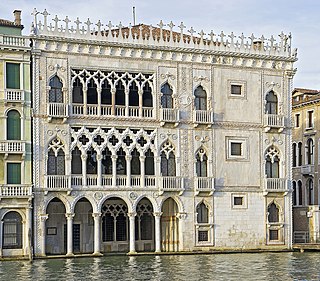
The Ca' d'Oro or Palazzo Santa Sofia is a palace on the Grand Canal in Venice, northern Italy. One of the older palaces in the city, its name means "golden house" due to the gilt and polychrome external decorations which once adorned its walls. Since 1927, it has been used as a museum, as the Galleria Giorgio Franchetti.

Ca' Rezzonico is a palazzo on the Grand Canal in the Dorsoduro sestiere of Venice, Italy. It is a particularly notable example of the 18th century Venetian baroque and rococo architecture and interior decoration, and displays paintings by the leading Venetian painters of the period, including Francesco Guardi and Giambattista Tiepolo. It is a public museum dedicated to 18th-century Venice and one of the 11 venues managed by the Fondazione Musei Civici di Venezia.

The Palazzo Barbarigo Minotto is a 15th-century palace on the Grand Canal in Venice, northern Italy, next to the much larger Palazzo Corner. Built in the Venetian Gothic style, it was originally two palaces, Palazzo Barbarigo and Palazzo Minotto, later joined together. The Barbarigo palace was owned by the Barbarigo family for several centuries and was the birthplace of Gregorio Barbarigo, who once refused the Papal Crown. It was later owned by the Minotto and Martinengo families.

The Fondaco del Megio is a palace in the sestiere (quarter]) of Santa Croce in Venice, northern Italy. Located near the Palazzo Belloni Battagia and the Fondaco dei Turchi, it faces the Canal Grande and is opposed to the church of San Marcuola of Cannaregio.

Ca' Tron is a palace in Venice, northern Italy, facing the Canal Grande. Part of the sestiere (quarter) of Santa Croce, it is situated between the Palazzo Belloni Battagia and Palazzo Duodo, near the church of San Stae. It is owned by the Università Iuav di Venezia and houses the Department of Design and Planning in Complex Environments.

Ca' Farsetti is a palace in Venice, Italy. It is located in the sestiere (district) of San Marco, and faces the Grand Canal, not far from the Ponte di Rialto.

Palazzo Dolfin Manin is a palace in the sestiere of San Marco on the Canal Grande of Venice, northern Italy. It is located near the Palazzo Bembo and Palazzo Dandolo Paolucci, not far from the Rialto Bridge.
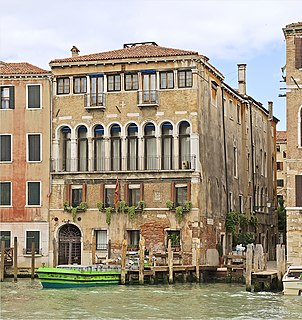
The Palazzo Donà della Madoneta is a Gothic-style palace located on the Canal Grande of Venice, between Casa Sicher and Palazzo Donà a Sant'Aponal in the Sestiere of San Polo, Venice, Italy.

The Palazzo Donà a Sant'Aponal, also known as the Palazzo Donà or Palazzo Donà dalle Trezze, is a Gothic-style palace located on the Canal Grande of Venice, between Palazzo Papadopoli and Palazzo Donà della Madoneta in the Sestiere of San Polo, Venice, Italy.
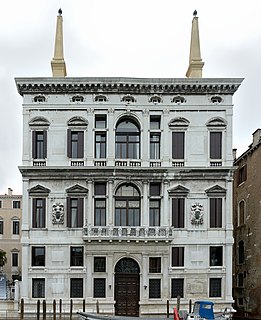
The Palazzo Papadopoli is a Baroque-style palace located on the Canal Grande of Venice, between Palazzo Giustinian Businello and Palazzo Donà a Sant'Aponal in the Sestiere of San Polo, Venice, Italy.

The Palazzo Genovese is a Gothic Revival-style palace located a few meters west of the Church of the Salute along the Grand Canal, the posterior facade abuts the church of San Gregorio in the Sestieri of Dorsoduro, Venice, Italy.

The Palazzo Pisani Gritti is a Venetian Gothic palazzo located on the north side of the Grand Canal, opposite the Church of the Salute, between the Campo del Traghetto and the Rio de l'Alboro, in the Sestieri of San Marco, Venice, Italy. It was the residence of Doge Andrea Gritti in the 16th century. It is now the Gritti Palace Hotel.

The Palazzo Giustinian Persico is an early-Renaissance-style palace located at the corner with the Rio di San Tomà, near Palazzo Tiepolo and across the canal from Palazzi Mocenigo on the Grand Canal, in the Sestieri of San Polo, Venice, Italy.
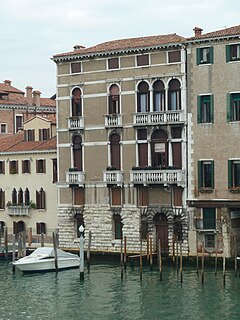
The Palazzo Boldù a San Felice is a palace located on the Canal Grande of Venice, between the Palazzetto Da Lezze and Palazzo Contarini Pisani in the Sestiere of Cannaregio, Venice, Italy.
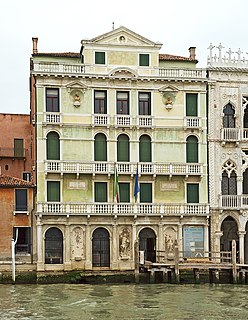
The Palazzo Giusti, also known as the Palazzo Miani Coletti Giusti, is a Neoclassic-style palace located on the Canal Grande of Venice, between Ca' d'Oro and Palazzo Fontana Rezzonico in the Sestiere of Cannaregio, Venice, Italy.

The Palazzo Marcello dei Leoni is a palace located between the Rio di San Tomà e Palazzo Dolfin, on the Grand Canal in the sestiere di San Polo in the city of Venice, Italy.

The Palazzo Pesaro Orfei or Palazzo Pesaro degli Orfei is a historic palace in Venice, in northern Italy. It was built by the Pesaro family in the fifteenth century in Venetian Gothic style. From 1902 it was the home of Mariano Fortuny and his wife Henriette Negrin. It now houses the Museo Fortuny, and may also be called Palazzo Fortuny.

Palazzo Bonfadini Vivante is a palace in Venice, Italy located in the Cannaregio district and overlooking the Cannaregio canal. The neighboring buildings are Palazzo Savorgnan and Palazzo Testa.

Palazzo Correr Contarini Zorzi is a Renaissance palace in Venice, Italy, overlooking the Grand Canal and locating in the Cannaregio district between Palazzo Querini Papozze and Palazzo Gritti. The palazzo is also known as Ca' dei Cuori, a family whose wrought iron coats of arms is present on the façade.